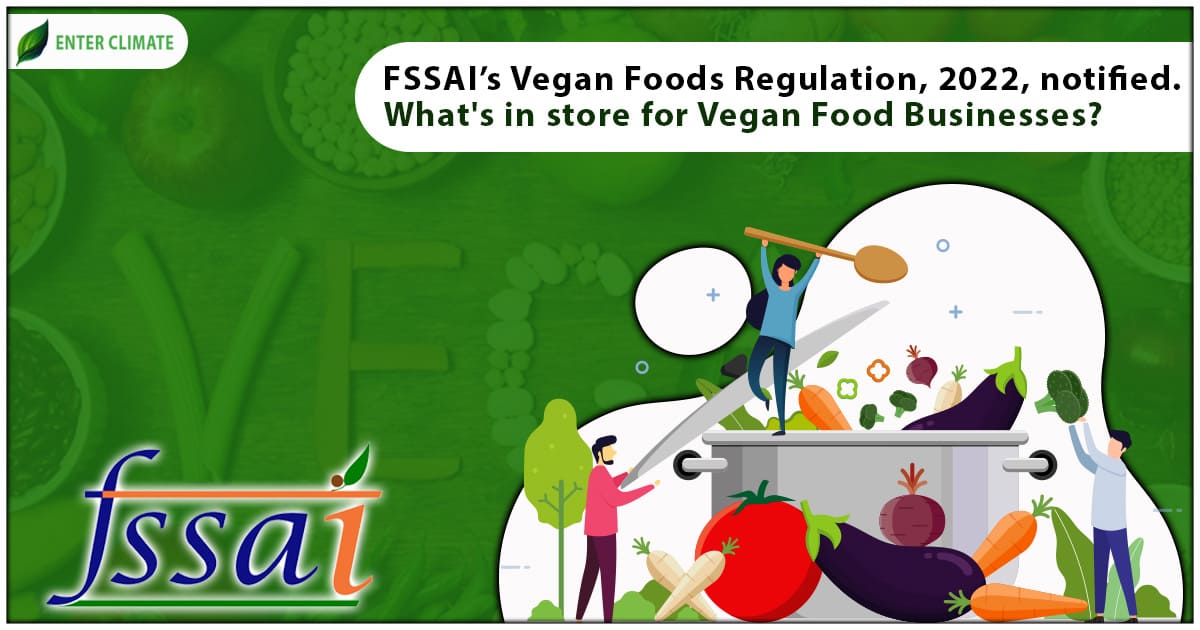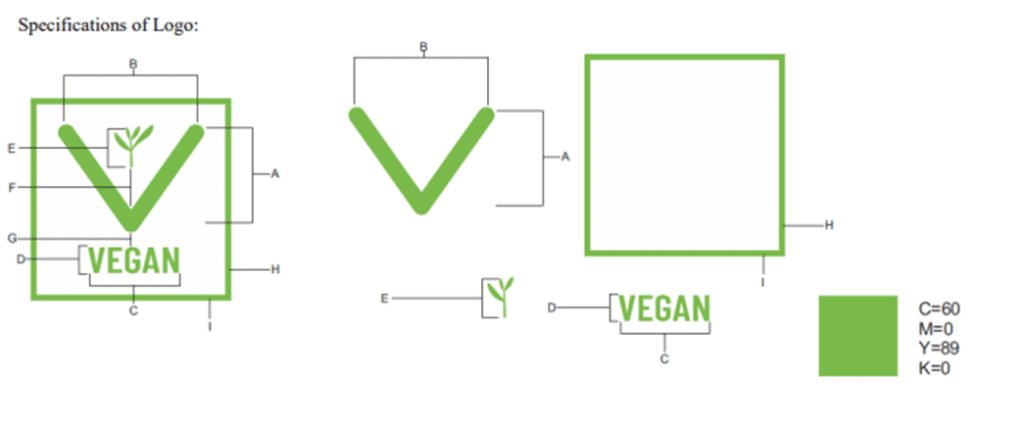FSSAI’s Vegan Foods Regulation, 2022, notified. What’s in store for Vegan Food Businesses?
 03 Jun, 2023
03 Jun, 2023 
Vegan Foods” means the food or ingredient, including additives, enzymes and carriers, flavourings or processing aids that are not products of animal origin. Further, in preparation of vegan food item, at no stage of processing, ingredients, including flavourings, additives, enzymes and carriers, processing aids etc., that are of animal origin has been used. The FSSAI has issued the Food Safety and Standards (Vegan Foods) Regulations, 2022, setting out the requirements for Vegan Food Business that caters to the plant-based food item market. The Regulations have laid down the rules that the food business operators must meet and how these products can be labelled. An amendment to the Food Safety and Standards (Vegan Foods) Regulations, 2022, has specified the labelling requirements that a vegan food item must display. Details about the logo and packaging have also been given in the rules in a way that makes it clear the product is plant-based. Imported products will need to follow these guidelines too. This write-up will provide an overview of the Food Safety and Standards (Vegan Foods) Regulations, 2022, and how you can endorse a vegan logo for your food items as a vegan food business operator.
Role of the Food Safety and Standards Authority of India (FSSAI)
As a food business operator, one has to ensure that the quality of food items is maintained to be of the applicable standards and is fit for eating when it reaches the customer through long, complex food supply chains. FSSAI, a statutory organisation under the Ministry of Health and Family Welfare, regulates, oversees, and monitors food safety in the country. The Food Safety and Standards Act 2006[1] is the key legislation for ensuring food safety along supply chains in both domestic and international trade. Deriving its power from the Act, FSSAI performs the following functions.
- Establishing Rules and Guidelines: The FSSAI is empowered to make rules on the standards for food safety.
- Issue Food Safety Licence: FSSAI has the authority to issue food safety licences and certifications for food businesses.
- Define Food Standard: The FSSAI defines the requirements and requirements for laboratories in the food industry, as well as the quality and standards of the food produced by the enterprises.
- Advise the government: FSSAI advises the government relating to food safety and potential food threats, as well as any recommendations to the government for formulating standards for food safety.
- Maintain Records and Data: FSSAI maintains records and data for all organisations registered under the FSSAI Act. The vegan food business operator may have its licence terminated for breaking any of the guidelines established by the FSSAI.
Highlights of the Food Safety and Standards (Vegan Foods) Regulations, 2022
The 2022 Regulation that came into effect in June defined the General and labelling requirement in the case of vegan food items. As per this regulation, no person can manufacture, sell, offer for sale, pack, market or distribute/ import any food item as a vegan food item unless they comply with the requirements laid down under the regulations. There following requirements will have to be met.
General requirements
General requirements for vegan food have been laid down under Regulation 3. These include
- Animal testing cannot be used to develop vegan products unless permission is given by any Regulatory Authority such as FSSAI.
- The packaging material used for vegan food items must comply with the packaging regulations and be suitable for vegan foods.
- A vegan food business operator must avoid any unintended presence of non-vegan substances and ensure that All stages of production, processing and distribution are designed to take precautions in conformity with Good Manufacturing Practices (GMP).
- In case, the same production line is used for vegan and non-vegan products. GMP must be ensured for all associated machinery, equipment, utensils and surfaces.
- The operator must comply direction of FSSAI to maintain the vegan integrity of the foods, ingredients, or products.
Labelling and display requirements
The vegan food business operator must store and display vegan food in a manner distinguishable from non-vegan food. Apart from that, after the approval, every package of vegan foods needs to carry the vegan logo.
Food Safety and Standards (Vegan Foods) Amendment Regulations, 2022
The FSSAI has amended the Food Safety and Standards (Vegan Foods) Regulations, 2022, as per which regulation 4, for sub-regulation (2), that gives the labelling requirement has been amended. Every package of vegan foods, after approval, shall carry the vegan logo.

Every package of vegan foods, after the approval, shall carry the logo as specified below:
| A | B | C | D | E | F | G | H | I | |
| Millimetres (mm) | 10 | 7 | 7 | 2 | 3.25 | 3.3 | 1 | 15 | 15 |
What is an FSSAI License, and who needs to apply?
Anyone engaged in food manufacture, production, processing, packing, transportation, distribution, or any other activity involving food is required to obtain food licence from the FSSAI. The FSSAI registration process depends on production capacity, business kinds, and turnover. A vegan food business operator will also need an FSSAI licence to be eligible for licences such as a basic licence, central licence, or state licence, depending on the installed capacity and turnover.
How to apply for FSSAI Licence
Stage 1: Application and document submission.
Vegan food business operators may also register offline by submitting Form A or B to the Food and Safety Department. The documents must be submitted to the Food and Safety Department with the application or uploaded electronically on the portal when filling out the application.
Stage 2: Document Scrutiny
The Department may accept or reject the FSSAI registration[2] form within seven days after the day it was received, either physically or electronically, through the site. If the application is rejected, the applicant must be informed in writing. Before issuing the FSSAI registration certificate, the Department will review the provided documentation and, if necessary, may inspect the food facilities.
Stage 3: Issuance of FSSAI Licence
The Department will issue an FSSAI certificate with the registration number, the applicant’s photo, and their email address if they are confident that the vegan food business operator meets all the requirements. Food Business Organisation or FBO should prominently display the certificate of FSSAI registration at a prominent area during business hours.
Documents Required for Obtaining FSSAI License
For FSSAI basic registration, FSSAI State licences and FSSAI Central licences, the following documents will be required.
- Identification Proof of the owners of food businesses.
- A business registration certificate
- Land ownership proof: such as rental agreement, NOC for the rented premises, utility bills etc.
- The management system plan for food safety.
- A list of manufactured or processed food items.
- Supporting documentation (if needed), such as a copy of the manufacturer’s licence, a municipal or panchayat NOC, or a health NOC.
A vegan food business operator will need the following documents to apply for an FSSAI state licence:
- Duly filled form.
- A plan of the processing unit displaying its measurements and space allocation according to operations
- A list of the owners, partners, and directors with their addresses, phone numbers, and photo IDs
- The name, number, and installed capacity of each piece of equipment or machinery used.
- A responsible person’s name and address were listed in an authority letter from the manufacturer.
- A report on the water analysis that will be used to verify portability.
- A copy of the certification acquired in accordance with the Multi-State Coop Act of 2002 and the Coop Act of 1861
The following specific documents must be submitted in addition to the general licence to receive an FSSAI central licence.
- A duly completed and signed form
- A plan of the processing unit displaying its measurements and space allocation according to operations
- A list of the owners, partners, and directors with their addresses, phone numbers, and photo IDs
- The name, number, and installed capacity of each piece of equipment or piece of machinery that is used.
- A responsible person’s name and address were listed in an authority letter from the manufacturer.
- A report on the water analysis that will be used to verify portability.
- Recall plan wherever applicable
- Source of raw material for milk, meat etc
- NOC/PA document issued by FSSAI.
- Ministry of Commerce Certificate for 100% EOU
- IEC Certificate.
- Form IX
- Supporting document for proof of turnover and transportation
- Declaration form
Guidelines for FBO for the submission of applications for the endorsement of vegan logo and formats
A vegan food business operator will have to submit an application to the concerned authority with all details in a format as specified by the authority as per the following annexures released by FSSAI.
- Annexure A provides the guidelines for the submission of applications for the endorsement of vegan logos,
- Annexure B provides the application for endorsement under FSS (Vegan Foods) Regulations, 2022, ((Form- A) and
- Annexure-C provides the approval/ rejection for endorsement of the vegan logo (Form-B).
Stages in Application for Vegan Logo Endorsement
Stage 1: Application and Fee Submission
The vegan food business operator will need to submit an application in FORM-A along with the necessary documents. The documents required include
- Name of the product
- Nearest Food Category
- State whether the product is domestically produced or imported
- CoA from FSSAI notified lab (If certified as Vegan by any 3td party agency: the application must include name and address of the certification agency, Process or Product certification, and Conditions complied for obtaining certification
- Copy of the label, along with a declaration of compliance with the extant FSSR
- Self-declaration that the product prepared is free from animal origin.
- In the case of imported products, CoA from ISO/IEC 17025:2017 accredited laboratory is to be provided.
Stage 2: Document Scrutiny
Food Authority will scrutinise the documents and may direct the applicant to submit additional documents, data or clarifications if needed.
Stage 3: Issuance of Approval
The vegan food business operator will, be granted Vegan Logo Endorsement approval to the applicant as per the procedure specified under the Food Safety and Standards Regulations, 2011.
Conclusion
Veganism is still in the early stages in India and is showing a strong growth trajectory. An audience of health-conscious consumers who are very curious about the idea and are looking at more and more plant-based options in their diet. Food business operators are targeting such people as it and filling this demand with certified food business operations. Many vegan and plant-based food items are in great demand on online platforms as well, which has opened an even bigger market and is helping today’s India make that switch. As food safety issues have received much attention in India in recent years, an entrepreneur wanting to enter into the vegan food business must fulfil all the legal obligations and conform with the applicable safety standards, hygiene, and labelling standards. In order to gain the edge and reduce the timeline needed for the extensive licencing and approval process, taking the advice of experts in the field is recommended.
Read our Article: License Needed To Start Food Waste Management Business












